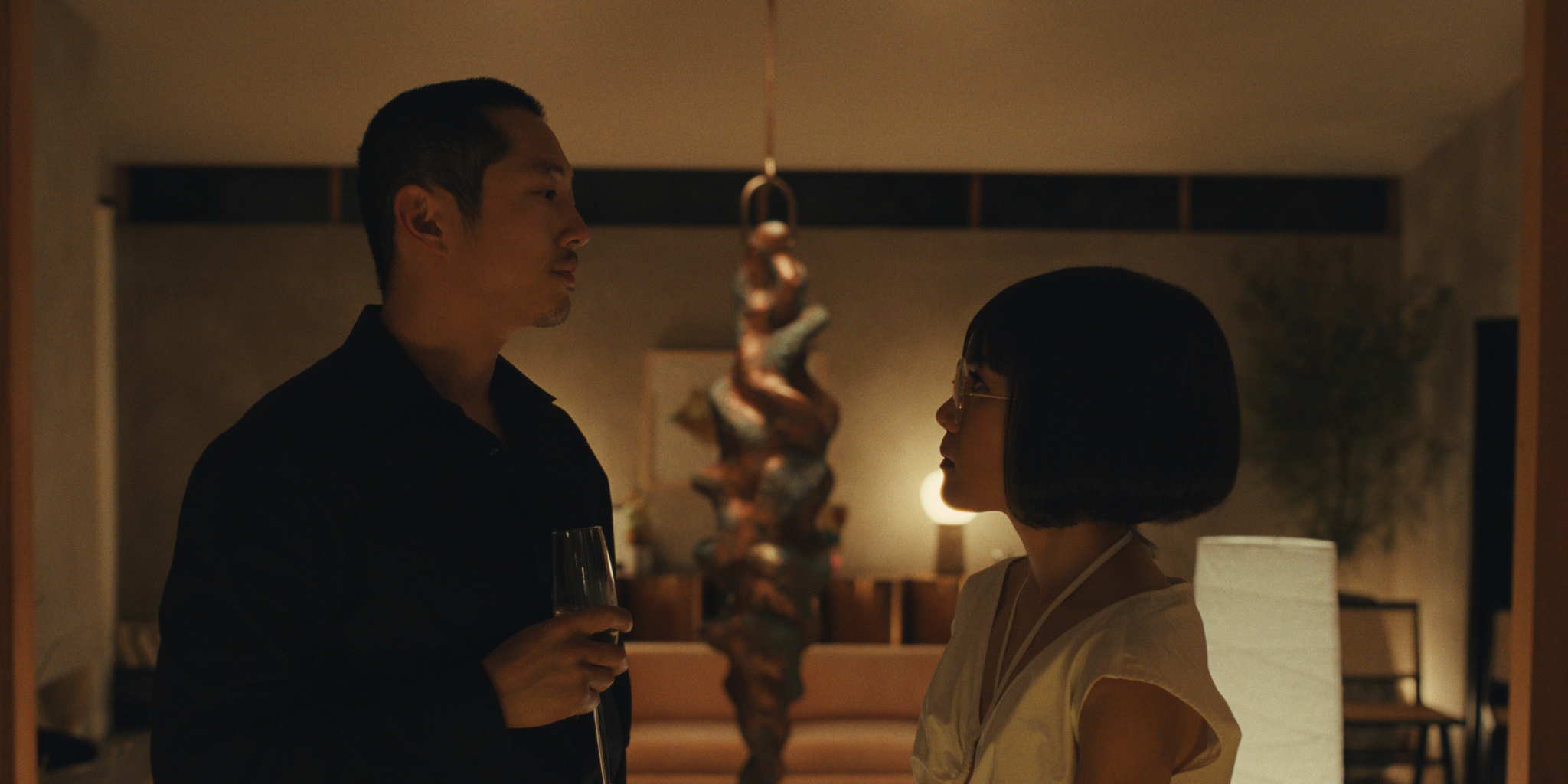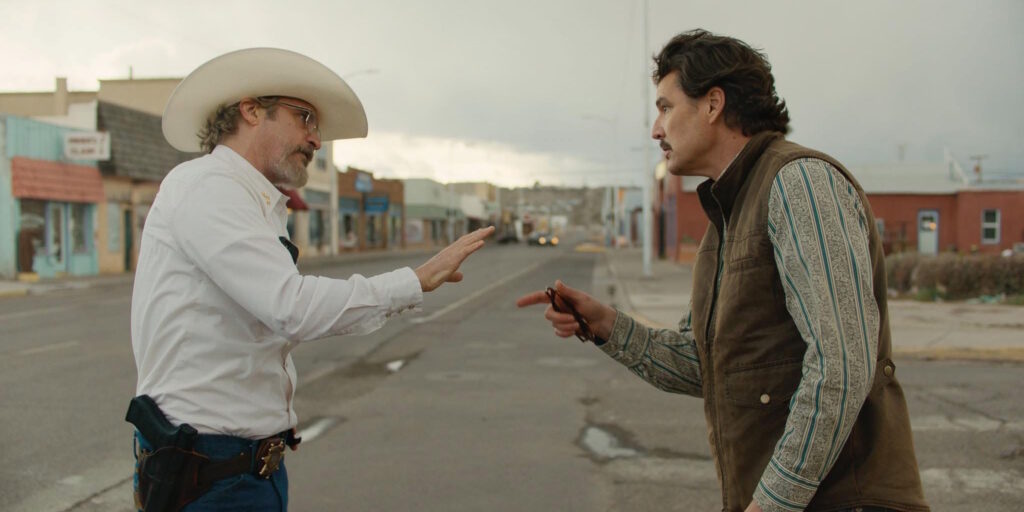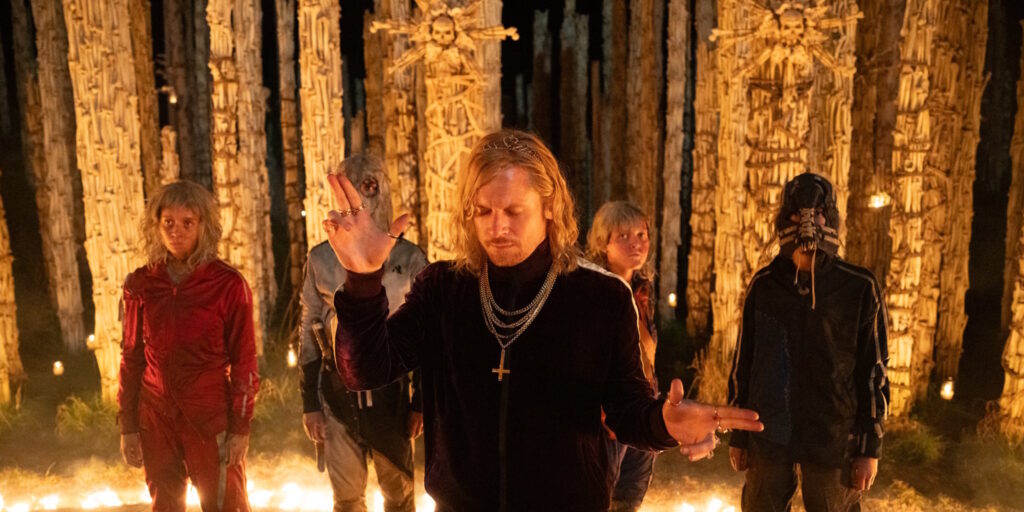If the first season of Lee Sung Jin’s sneakily brilliant new series Beef is any indication, the show may one day be mentioned in the same breath as Vince Gilligan’s medium-defining twofer Breaking Bad (2008-13) and Better Call Saul (2015-22). It’s not just that Beef is great television – although it is that – but that it pulls off a similar magic trick as Gilligan’s works. Lee and his collaborators start from a juicy elevator-pitch premise and escalate it with thumbscrew precision into a pitch-black comedy of ruinous human folly. Yet Beef is more than a roller-coaster farce about terrible people doing terrible things. It slowly reveals itself as a startlingly dolorous rumination on the absurd agony of being human: the bubbling stew of anger, sorrow, and shame that provokes us into lashing out at the world, as if spreading our misery around will somehow alleviate it. As a character wonders aloud, “Why is it so hard for us to be happy?” – a rhetorical query that might as well be the show’s tagline.
Beef opens with an encounter in the parking lot of a big-box home-improvement store: Frustrated with a failed merchandise return, independent contractor Danny Cho (Steven Yeun) pulls his pickup truck out of its parking space a little too quickly and almost runs into a white luxury SUV. The driver lays on their horn and flips Danny the middle finger before speeding off. This proves to be the latest bite in a colossal shit sandwich that Danny feels like he’s been obliged to choke down, and he can’t let it go. Spitting wild-eyed curses, he pursues the SUV on a ludicrous Mad Max chase through suburban Los Angeles, with the two vehicles running red lights and cutting through flower beds. The accursed SUV eventually gives Danny the slip, but not before he memorizes the license-plate number.
The driver turns out to be one Amy Lau (Ali Wong), the owner of a chic nursery that sells high-end potted plants to wealthy Angelinos. She is on the verge of licensing her business to a billionaire retail mogul, Jordan (Maria Bello), who wants to place Amy’s products in thousands of stores nationwide. This imminent deal is putting a monumental amount of pressure on Amy, although she hopes that the sale will allow her to spend more time with her sculptor husband, George (Joseph Lee), and her young daughter, June (Remy Holt). She downplays the road-rage incident with the unseen driver in the red pickup truck – that is, until Danny tracks down her address, talks his way into her house, and vandalizes her bathroom in petty revenge. She responds by spamming his business with negative Yelp reviews. From there, their conflict snowballs into a demented feud that consumes both of their personal and professional lives and inflicts a staggering amount of collateral damage.
The first-order appeal of Beef hinges on its sharp atmosphere of perilous escalation. It’s a fabulously tense story in which the dueling protagonists keep making increasingly awful, risky decisions, just to make one another bleed (metaphorically … at first). By the second episode, it’s obvious that the catalyzing road-rage encounter has become incidental, as Danny and Amy have turned each other into effigies for their own overflowing frustrations, resentments, and self-loathing. It’s both exhilarating and excruciating to watch, with Lee and his writers – including novelist Jean Kyoung Frazier and The Office and The Rehearsal vet Carrie Kemper – taking tonal cues from Billy Wilder, William Rose, Frank Oz, and the Coen Brothers. There’s also more than a little Greek tragedy in Beef’s genome: Every bad decision that the characters make eventually comes back to bite them with laser-guided, Oedipal ruthlessness. A recurring motif involving crows also suggests a watchful, darkling presence on the margins of the story, one that might indicate hovering doom – or perhaps revelation or transformation.
Although Lee claims that the series is not about race per se, Beef nonetheless exhibits a remarkable sensitivity to the fine-grained details of the Asian-American experience, warts and all. This ranges from the way that familial duty and guilt can be weaponized to the central role of strip-mall evangelical Christianity in Korean-American communities. The writing is outstandingly shrewd and textured: Witness how Amy subtly leverages intra-Asian prejudices to convince her Japanese-American husband that Danny is bad news, or the way that Danny’s encounters with anti-Asian bigotry shape his prickly attitude about his brother Paul’s (Young Mazino) interest in a white Instagram model. Beef has a keen eye and a smooth touch when it comes to these dynamics, as well as those dealing with class, gender, family, art, and commerce. (It’s also a pretty great Los Angeles show, making fine, story-centered use of the city’s various municipalities and neighborhoods.)
In a few short years, Yeun has established himself as one of the most talented and intriguing American actors of his generation with films like Burning (2018) and Minari (2020). It therefore should come as no surprise that he compels here. Danny is a challenging character, being a broadly unlikeable hothead with an inclination for crooked schemes and aggrieved blame-shifting. Yet Yeun digs deeply and thoughtfully into the man’s anguished psyche, discovering rich pathos and hinting at the buried fears and regrets that don’t come to light until late in the series. If Yeun delivers at the refined level viewers have come to expect from the actor, Wong is the series’ revelation. Beef gives the actress and comedian – probably best known for her stand-up specials – an opportunity to shine dramatically. And shine she does, marvelously portraying Amy’s have-it-all girlboss ambition, the raging narcissism beneath it, and the cracked-mirror vulnerability beneath that. She proves to be a master of the brittle bougie smile, and the intensity of Amy’s agony as she dutifully grins through innumerable sexist and racist interactions is consistently mesmerizing.
Danny and Amy are the heart of this story, but Beef carves out a surprising amount of space for secondary and even tertiary characters. The show not only illustrates how the core feud ripples out in unforeseen ways but also underlines how the protagonists’ egocentrism and incandescent hatred have blinded them to the humanity of others. The quagmire of “main character syndrome” is a key theme of the show, which implicitly links this thoroughly contemporary concept to Jungian psychology and Buddhist philosophy. Consider a scene where Amy’s widowed mother-in-law (Fumi Nakai), initially depicted as something of a prying harridan, eats alone at a café, vainly phoning her aging, unavailable peers in search of someone – anyone – to talk to. Or an eccentric sequence where Jordan’s sister-in-law and assistant, Naomi (Ashley Park), picks despairingly through her wardrobe of designer clothing and, as a kind of anxiety-soothing ritual, lies down and zips herself into a garment bag.
Such touches speak to Lee’s deeper intentions beyond the queasy thrills of two selfish assholes butting heads in increasingly deranged and dangerous ways. With slow, steady confidence, Beef reveals itself as a melancholic, multilayered story about the suffering that lies at the heart of the human experience, an ineffable inner pain that only seems to have intensified in the modern era. An early tell of this grander ambition can be found in the poetic episode titles, which are derived from quotes from figures such as Sylvia Plath, Ingmar Bergman, and Franz Kafka. Beef is about how the intensity of our spiritual suffering pushes us to see others not as people who are also going through it (as the phrase goes) but as convenient outlets for our frustration and self-loathing. It’s sort of remarkable that R.E.M.’s thematically on-the-nose “Everybody Hurts” never pops up in the show, given how dense the soundtrack is with 1990s needle drops from the likes of Tori Amos, Bush, and the Smashing Pumpkins. (A mix that reflects the arrested emotional development of its millennial protagonists.)
Above all, Beef feels like a plea for radical empathy, a call for a spiritual jubilee: bury the hatchet, drop the baggage, purge the poison of enmity from your soul. At one point, Amy asserts, “Everything fades, nothing lasts,” and although she is speaking of the fleeting nature of success and happiness, the series gradually turns this sentiment on its head. It takes time, energy, and resources to sustain hatred, after all, and life is far too short to pay such a price.
Further Viewing: Used Cars (1980), Polyester (1981), Ruthless People (1986), Dirty Rotten Scoundrels (1988), Heathers (1988), The War of the Roses (1989), Election (1999), Mean Girls (2004), Ingrid Goes West (2017),The Banshees of Inisherin (2022).
Beef is now available to stream on Netflix.





One Response
What a clever thoughtful analysis. Thank you.